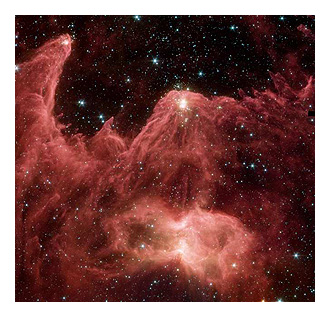|
God, the
Multiverse—
and Cosmic Arrogance
Michael
Turner
Distinguished Service
Professor, Astronomy and Astrophysics
Director, Kavli Institute for Cosmological Physics
—University of Chicago—
Tuesday,
April 26, 5:30-8:30pm
19 South Wabash, 2d floor
Cocktails at
5:30, presentation 6:00-6:30 followed by discussion and more
cocktails. $40 includes drinks, two cigars,
and sandwiches.
Reservations are required.
SCIENCE HAS NOT HAD MUCH NEW TO SAY ABOUT GOD SINCE
mathematician Pierre-Simon Laplace remarked to Napoleon that he
had no need for "that hypothesis" when asked why he had
neglected
 the
deity in his treatise, Celestial Mechanics (1799-1825).
Stephen Hawking recently published a book in which he says
"there is no necessity for God" -- a statement that the media
perhaps willfully misconstrued as "there is no God." How
is it then that the laws of physics allow for the miracle of our
existence? A universe in which there is an excess of matter over
antimatter, where galaxies host stars that last billions of
years and harbor planets, and in which carbon-based organisms
evolved. Such a miracle would not have occurred if the constants
of nature had been slightly different. Reminiscent of
Winston Churchill's faint praise of the United States -- that we
get it right after we have exhausted all the alternatives -- it
may be that every possible kind of universe, with every possible
variation on the laws of nature, exists in a grand and
impossibly enormous multiverse, in which every
alternative is tried, somewhere. We find ourselves in the
only universe from among these multitudes that can support our
existence. The multiverse is possibly the most important
idea of our time, and may even be right, but it gives me a
headache. Is it science if we can't test it?
Can something come from nothing? Why? the
deity in his treatise, Celestial Mechanics (1799-1825).
Stephen Hawking recently published a book in which he says
"there is no necessity for God" -- a statement that the media
perhaps willfully misconstrued as "there is no God." How
is it then that the laws of physics allow for the miracle of our
existence? A universe in which there is an excess of matter over
antimatter, where galaxies host stars that last billions of
years and harbor planets, and in which carbon-based organisms
evolved. Such a miracle would not have occurred if the constants
of nature had been slightly different. Reminiscent of
Winston Churchill's faint praise of the United States -- that we
get it right after we have exhausted all the alternatives -- it
may be that every possible kind of universe, with every possible
variation on the laws of nature, exists in a grand and
impossibly enormous multiverse, in which every
alternative is tried, somewhere. We find ourselves in the
only universe from among these multitudes that can support our
existence. The multiverse is possibly the most important
idea of our time, and may even be right, but it gives me a
headache. Is it science if we can't test it?
Can something come from nothing? Why?
Michael S. Turner
is a theoretical astrophysicist and the Bruce V. and Diana M.
Rauner Distinguished Service Professor at the University of
Chicago. He is also Director of the
Kavli Institute for Cosmological Physics
at Chicago, which he helped to establish. Turner was born in Los
Angeles, CA, and attended public schools there; he received his
B.S. from Caltech (1971), his M.S. (1973) and Ph.D. (1978) from
Stanford (all in physics) and an honorary D.Sc. from Michigan
State University (2005).
Turner helped to pioneer the
interdisciplinary field of particle astrophysics and cosmology
(for which he shared the 2010 Dannie
Heineman Prize), and with Edward Kolb initiated the
Fermilab astrophysics program which today
accounts for about 10% of the lab’s activities. He led the National Academy
study Quarks to the Cosmos that laid out the strategic vision
for the field.
Turner’s scholarly contributions include
predicting cosmic acceleration and coining the term dark energy,
showing how quantum fluctuations evolved into the seed
perturbations for galaxies during cosmic inflation, and several
key ideas that led to the cold dark matter theory of structure
formation.
His honors include Warner Prize of the
American Astronomical Society, the
Lilienfeld Prize of the American Physical Society (APS), the
Klopsted Award of the American Association
of Physics Teachers and the Heineman Prize
(with Kolb) of the AAS and American Institute of Physics.
Turner’s twenty-plus former Ph.D. students
hold faculty positions at leading universities around the
country (e.g., Chicago, Caltech and University of Michigan), at
national laboratories (Fermilab, JPL, and
Argonne) and on Wall Street.
He has served as Chief Scientist at
Argonne National Laboratory (2006 to 2008), Assistant Director
for the Mathematical and Physical Sciences at the National
Science Foundation (2003 to 2006), Chair of the Department of
Astronomy and Astrophysics (1997 to 2003) and President of the
Aspen Center for Physics (1989 to 1994).
Turner’s recent national service includes
membership on the NRC’s Astronomy Decadal Survey (Astro2010) and
Board on Physics and Astronomy; and membership on the NASA
Advisory Committee (NAC) and on the Senior Editorial Board of
Science Magazine. Turner is currently
Chairman of the Board of the Aspen Center for Physics, a
Director of the Fermi Research Alliance, and a member of the
Governing Board of the National Academy of Sciences (NAS
Council).
Turner was elected to the
Presidential-line of the American Physical Society in 2010 and
will serve as its President in 2013.
April 26 -
1514
- Copernicus made his first observations of Saturn.
|